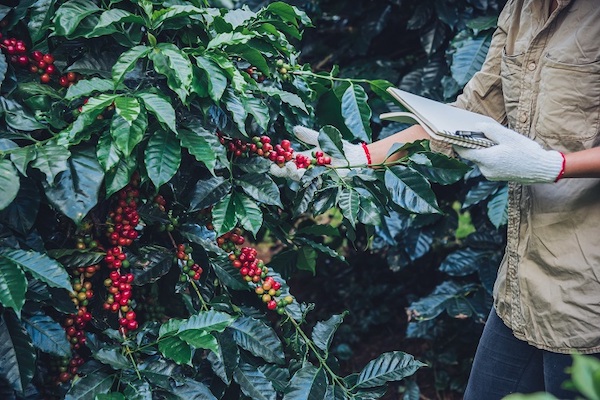Over the next 30 years, the regions suitable for growing coffee are expected to decline by some 50%, according to some climate models. The decline is primarily the result of an expected increase in annual temperatures in key coffee-producing countries like Brazil, Vietnam, Indonesia, and Colombia. The world could be spared a future in which coffee is a luxury item – or just a memory – thanks to several startups that are working on “beanless coffee”. Yes, you read that right… “beanless coffee”
There are around 130 species of coffee plants but not all of them are suitable for cultivation and only a fraction of them actually taste good. The coffee variety that most people consume in their daily cup is “arabica,” which provides about 60% of coffee globally. The other 40% is mostly “robusta” coffee, which goes into instant coffees and espresso mixes.
Arabica is a cool tropical plant that doesn’t like high temperatures while robusta can tolerate higher temps but prefers high rainfall. These ideal growing conditions are disappearing bit by bit as the world’s climate changes.
Several startups are working on ways to “future-proof” coffee supplies. While they are all exploring different technologies, the end goal is the same – create more sustainable and affordable alternatives today to save us from even more volatile commodity prices tomorrow. But as many industry analysts have pointed out, convincing consumers to ditch their favorite beverage because it might not be available at some point in the future is not an easy sell.
Founders at several of these beanless coffee startups have admitted the pitch for their products is especially tough as consumers may not understand or care about this future problem that the companies are trying to solve. Meaning the market may be very limited. And as with other “alternative” products, such as meatless-meats and dairy-free dairy products, the beanless coffees are so far quite a lot more expensive than a real cup of joe.
Atomo CEO Andy Kleitsch explained that “the target audience we’re going after is the alternative milk drinker. A person that has made dietary changes for environmental or health reasons.” Other beanless coffee startups have a similar target market. Most also stress that the goal isn’t to replace traditional coffee crops, but to make it more resource-efficient, sustainable, climate-proof, and cost-effective. Below is a handful of what seem to be the more well-funded companies currently in the space.
Atomo: This Seattle-based startup has raised over $51 million from investors and is getting ready to open a new facility next March with a capacity to produce four million pounds of its plant-based ground “coffee.” Atomo’s brew is a combination of date seeds, ramon seeds (also known as maya nuts), sunflower seed extract, fructose, pea protein, millet, lemon, guava, defatted fenugreek seeds, caffeine from green tea, and baking soda. CEO Andy Kleitsch says, “We’ve been approached by almost every major coffee company in the world because of what we call “the 2050 problem,’ that by 2050 they’re going to have considerable supply chain problems with coffee.” The company right now is focused on its first product, a beanless espresso, that is initially being sold to coffee shops and other businesses. Atomo is charging coffee shops $20.99 a pound vs $10 to $14/lb for comparable coffee products, according to AgFunder.
Minus Coffee: San Francisco-based Minus Coffee uses synthetic biology to make coffee without beans through molecular extraction. Minus’ beanless cold brew comprises seven principal ingredients – date seeds, chicory, sunflower seeds, carob, lentils, grape seeds and millet malt. All these are first roasted, and then fermented to create an extract that boasts “bold, orange peel acidity and an undercurrent of sweet cherry and dark chocolate”. The natural caffeine content is extracted from tea leaves. The start-up is currently exploring additional products, including packaged ground coffee alternatives, alongside potential distribution partnerships with US retail and food service outlets.
Northern Wonder: Dutch food tech brand Northern Wonder makes Coffee-Free Coffee capsules and filter blends. Its medium-roast ground filter blend can be prepared like traditional filter coffee, while its beanless coffee pods are Nespresso-compatible. Both are available in caffeinated and decaf versions. The brand is also developing espresso-style grounds, cold brew and – what is likely to create a huge buzz – whole beans. The filter blend contains a roasted blend of lupin beans, barley, rye, chickpeas and chicory, while the capsules contain roasted lupin, barley, rye, fig, chickpea and chicory.
Prefer: Singapore-based Prefer makes bean-free ground coffee. It uses a novel fermentation process that converts food byproducts from beer, bread and tofu manufacturing into key coffee aroma molecules. The brand says that although it has started with coffee, its fermentation technology has the potential to create more affordable and sustainable flavours. The end goal is to create alternatives to threatened natural flavors like cacao, vanilla, and citrus.
Stem: Parisian food tech firm Stem, which claims to be the world’s first startup developing mass-produced cell-cultured coffee. The company extracts DNA from the coffee leaf and apply certain protocols before bioprinting the cells onto scaffolds, which can then be ground to make green coffee for roasting. In terms of tissue engineering, it is similar to cell cultured meat. However, the cost of the growth media, which can be prohibitively expensive in cell-based meat production, is only around $10 per liter, versus $400 for meat. There are no details as to when Stem’s beanless coffee will be available.
Voyage Foods: California-based Voyage Foods already has a range of nut-free butters and a cacao-less chocolate spread. With nearly $42 million in funding to date, it’s now working on a beanless coffee made from upcycled grains and legumes. “The production process is similar to traditional coffee manufacturing with some small modifications, with no cellular agriculture or fermentation used,” according to a company spokesperson. The new brew has not yet been released but will likely be in restaurants and coffee shops first.










